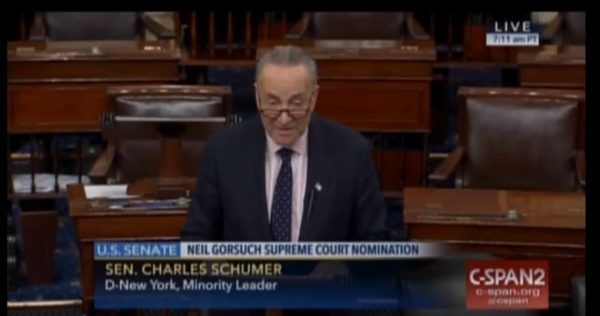
Perennial anti-gun Sen. Charles Schumer (D-NY) is quoted in Thursday’s Washington Times that he will attempt to filibuster the Supreme Court nomination of Judge Neil Gorsuch when it comes to the Senate floor.
According to the newspaper, Schumer says that Gorsuch would “tilt the Supreme Court too far away from what Democrats want to see.”
Considering some of the questions asked of Judge Gorsuch earlier this week during two days before the Senate Judiciary Committee, Democrats want to see an anti-gun liberal fill the seat left vacant by the death last year of cornerstone conservative Justice Antonin Scalia. In other words, they want to see the high court tilt to the left.
But the veteran Capitol Hill gun prohibitionist, who has claimed credit for the Brady gun control law, may have trouble because his party does not control the Senate. Schumer stated that he reached this decision “after careful deliberation.” Watch his remarks here.
Earlier in the week, Judge Gorsuch told the Judiciary Committee that the 2008 Heller ruling that struck down the handgun ban in Washington, D.C. and affirmed that the Second Amendment protects an individual civil right is “the law of the land.” This came after another anti-gun Democrat on the panel, Sen. Dianne Feinstein, misquoted the Heller decision, changing the context.
As previously reported by Liberty Park Press, this was Sen. Feinstein’s question to Judge Gorsuch:
“In D.C. v. Heller, the majority opinion written by Justice (Antonin) Scalia recognized that, and I’m quoting, ‘Of course the Second Amendment was not unlimited,’ end quote. Justice Scalia wrote, for example, laws restricting access to guns by the mentally ill or laws forbidding gun possession in schools were consistent with the limited nature of the Second Amendment. Justice Scalia also wrote that, ‘Weapons that are more useful in military service, M-16 rifles and the like, may be banned without infringing on the Second Amendment.’ Do you agree with that statement that under the Second Amendment weapons that are most useful in military service … may be banned?”
But that’s not exactly what the 2008 Heller ruling stated. Here’s the actual text of the paragraph as written in the majority opinion by Scalia:
“It may be objected that if weapons that are most useful in military service—M-16 rifles and the like—may be banned, then the Second Amendment right is completely detached from the prefatory clause. But as we have said, the conception of the militia at the time of the Second Amendment’s ratification was the body of all citizens capable of military service, who would bring the sorts of lawful weapons that they possessed at home to militia duty. It may well be true today that a militia, to be as effective as militias in the 18th century, would require sophisticated arms that are highly unusual in society at large. Indeed, it may be true that no amount of small arms could be useful against modern-day bombers and tanks. But the fact that modern developments have limited the degree of fit between the prefatory clause and the protected right cannot change our interpretation of the right.”
Schumer’s opposition to Gorsuch was essentially predictable, especially after the judge repeatedly declined to take positions on issues that might come before the court. Democrats seem particularly concerned that the court will continue recognizing the Second Amendment as originally intended by the Founders.
“The answer isn’t to change the rules, it’s to change the nominee,” Schumer reportedly stated.
Many of Schumer’s long disenfranchised gun-owning constituents might argue that the real answer is to change their senator.
Related:
Did Feinstein Quote Heller Out of Context to Play ‘Gotcha?’
Judiciary Dems Confirm Animosity toward 2A in Gorsuch Hearing
Anti-Gunners Fearful Of Gorsuch On Gun Rights